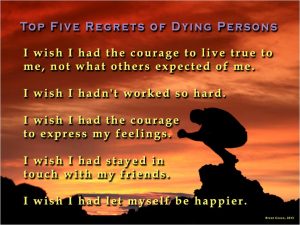An Australian woman invested many years working as a palliative care and hospice nurse. This angel of mercy, as are so many in her profession, cared for patients during the last twelve weeks of their lives.
Bronnie Ware became interested in what these dying people thought about life, in reflection, particularly their regrets. She recorded their final epiphanies about life and then turned her observations into a book entitled The Top Five Regrets of the Dying: A Life Transformed by the Dearly Departing.
“When questioned about any regrets these patients had or anything they would do differently,” said Ware speaking with a reporter for The Guardian,”common themes surfaced again and again.”
Here are the top five regrets about choices made in life as chronicled by Nurse Ware:

The third most common regret is of interest to me today as we experience dying off of The Greatest Generation. This generation is about to become fully ancestral — as do all generations with enough years passing.
The youngest of this cohort is age 92 in 2017; the oldest is 117, if any of such advanced age still survive, which is doubtful. Born in 1911, my father was a stellar example of his generation: moral, humble, hard-working, dedicated to community service, and generous. Gilbert Green would have turned 106 on February 20th.
I never asked him about his regrets, if he had any, but now I wish I would have had the courage to express my feelings more clearly about how much I appreciate all that he did for our family. He remains a moral compass in the present, giving me true bearings every day as I make choices about how best to live with integrity and honesty.
If your parents are still living, and especially if they are surviving members of The Greatest Generation, I beseech you to find the courage to express everything you have to share. Tell them how much you appreciate their mentoring. Tell them how their values shall live on through you, your children and grandchildren. Express your feelings without shame, fear, or embarrassment. Interview them and record videos to create a poignant historical record for future generations of your family.
The Living Years Give Us A Time-Limited Opportunity to Eliminate Regrets
Mike + The Mechanics, an English pop/rock supergroup, formed in 1985 as an initiative of Mike Rutherford, one of the founding members of the band Genesis. This group is known for several hit singles, including Silent Running (On Dangerous Ground), All I Need Is a Miracle, Word of Mouth, Over My Shoulder, and, importantly for this post, The Living Years.
Released in December 1988 in the UK and US as the second single from their album, Living Years, this song addresses a son’s regrets over unresolved conflict with his deceased father — the son’s failure to express his feelings when he had a chance. As the song poetically conveys, the thriving as well as the dying can share the same regrets about failing to communicate.
So please listen to this song and think about the people in your life with whom you’ve not fully expressed your feelings. Think especially about your dad. Then tell him how you feel.
I would very much appreciate learning how this post and Mike Rutherford’s song may have given you additional incentive to express your feelings to your father, mother, and those closet to you.
Say it loud (say it loud), say it clear (oh say it clear)
You can listen as well as you hear
It’s too late (it’s too late) when we die (oh when we die)
To admit we don’t see eye to eye…
AVAILABLE ON AMAZON. CLICK HERE.
We’d love your help spreading the word about Questions of the Spirit. Please share this book and website with your contacts on LinkedIn, Facebook and Twitter.
